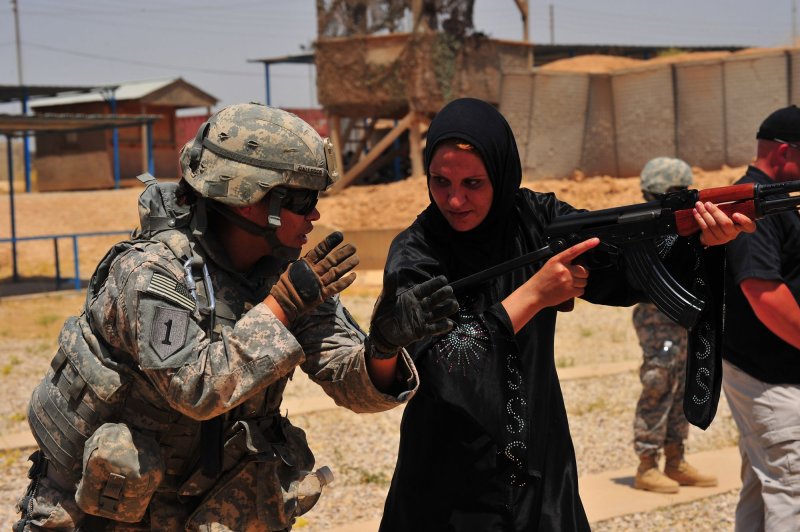1 of 2 | U.S. Army Spc. Claudia Gallegos, left, with 855th Military Police Company, 317th Military Police Battalion, 49th Military Police Brigade, attached to 3rd Infantry Division, coaches a female Iraqi Police recruit on a range near Mosul, Iraq, July 9, 2010. Gallegos's unit and Iraqi Army soldiers helped train the recruits. UPI/Edward Reagan/US Army |
License Photo
WASHINGTON, Oct. 24 (UPI) -- A U.S. Iraqi police-training program has no performance measures and risks becoming a "bottomless pit," wasting U.S. taxpayer money, a watchdog group said.
The State Department program to maintain peace when U.S. troops leave Iraq at the end of the year doesn't have Iraqi government support, the U.S. Special Inspector General for Iraq Reconstruction said Monday.
And only about 12 percent of the $887 million projected to be spent from this month through December will be spent on actually helping Iraq's police, the SIGIR report said. The "vast preponderance" will be spent on the security, transportation and medical support of the program's 115 police advisers, SIGIR said.
"Without specific goals, objectives and performance measures, the [Police Development Program] could become a 'bottomless pit' for U.S. dollars intended for mentoring, advising and training the Iraqi police forces," the report said.
The program's price tag has also risen, with the cost of each trainer rising to $6.2 million a year, it said.
Iraqi Deputy Interior Minister Adnan al-Assadi told SIGIR he thought Iraq saw little or no benefit from the program, which adds to the $8 billion the U.S. Defense Department has spent since 2003 to train, staff and equip Iraqi police forces before passing on the responsibilities to the State Department this month.
"I don't need it. I won't ask for it," Assadi was quoted in the report as saying.
"What tangible benefit will Iraqis see from this police training program?" the minister asked, suggesting Washington "take the program money and the overhead money and use it for something that can benefit the people of the United States, because there will be very little benefit" to Iraq's interior ministry, responsible for policing, national security and immigration matters.
William Brownfield, U.S. assistant secretary of state for international narcotics and law enforcement affairs, said the department "generally agrees" with the report's recommendations, but defended the program.
The State Department -- which SIGIR said did not fully cooperate with the report -- will seek to cut costs in coming years and hire more Iraqi support employees, Brownfield said.
The department has also been impeded by Iraq not having a permanent interior ministry and by delays from an independent organization that was supposed to do a detailed assessment of Iraqi police capabilities.
That report will be completed next month, he said.















